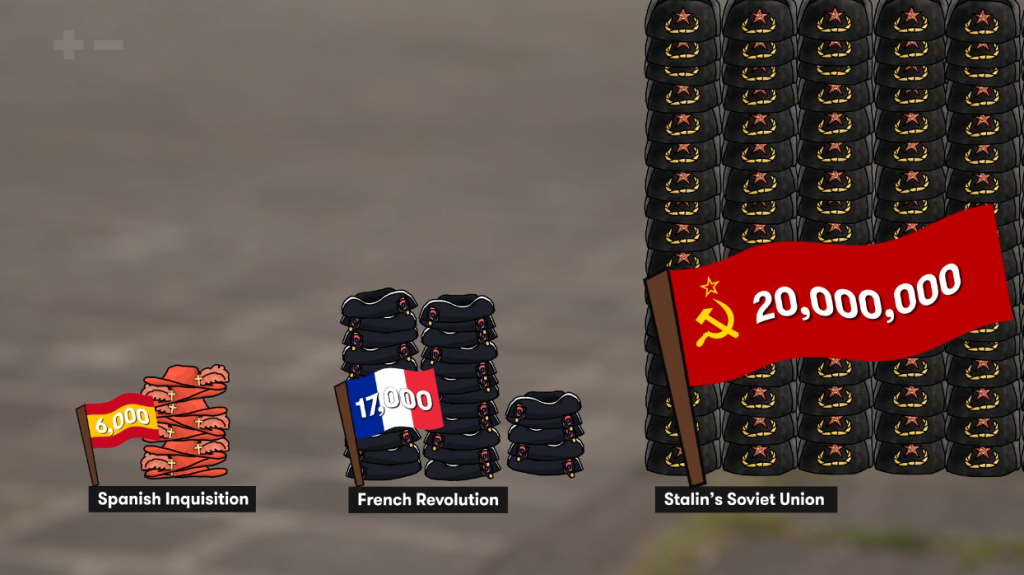Youth Resource
Does religion cause all wars?
This segment comes from Episode 1: War + Peace.
From Jesus’ command to “love your enemies” to the idea of “holy war” is a giant leap. Yet from the Old Testament through to the Crusades and the inquisitions, Christian history is full of violence. Has Christianity been a major contributor to war? This segment tackles the popular belief that religion has caused all, or most, of the wars of history.
Videos
-
Does religion cause all wars?
Would the world be a more peaceful place without Christianity?
Transcript
JUSTINE TOH: “Those who can make you believe absurdities can make you commit atrocities.” Or so said the provocative French philosopher Voltaire, 200 years ago. Plenty of people today would agree with him.
KAREN ARMSTRONG: I get sick of getting into a London taxi and there comes a moment when the taxi driver will say what do I do for a living? And I tell him I write about religion. And then he will intone this sentence (which is repeating it like a kind of mantra), “Religion has been the cause of all the major wars in history.” Utter nonsense!
JUSTINE TOH: There’s no doubt religion has contributed significantly to conflicts, but it’s also true that removing religion doesn’t solve the problem.
Take, for example, that great humanist experiment, the French Revolution. The champions of “Liberty, equality, and fraternity” couldn’t exactly hold their heads up high.
The Spanish Inquisition executed an estimated 6000 so-called heretics over its 350-year history.
The “Reign of Terror” during the French Revolution executed 17-thousand people, in just nine months.
Then there’s Stalin’s Soviet Union, a dogmatically atheist regime, responsible for the deaths of around 20 million people over about 30 years. That’s two whole Spanish Inquisitions … every week.
I certainly don’t want to suggest that non-religious people are more violent than religious people, or that religious people haven’t been incredibly violent. Only that the human capacity for brutality is vast, and not at all limited to religious causes or religious people. Maybe there are wars because there are humans, and any ideology can be a source of violence and hatred.
close
Theme Question
Mark on the line your level of agreement or disagreement with the following statement: “Religion has caused all the wars of history.”
Engage
Understand & Evaluate
Watch the segment: Does religion cause all wars?
- The video segment opens with a quote from the French philosopher Voltaire: “Those who make you believe absurdities, can make you commit atrocities.” In your own words, explain what Voltaire meant by this.
- Outline the point being made by these graphics from the video.

- Justine Toh states that “the human capacity for brutality is vast”. What is your reaction to this statement?
- In one sentence, summarise the argument that this segment makes about human violence.
Bible Focus
Read Psalm 14:2-3 and 1 John 1:8-9.
- What do these verses say about the state of all humans? To what extent do you agree with this?
- With these verses in mind, should we be surprised when people act in an immoral or sinful manner?
- What hope do these verses give for humanity?
Apply
- Read the following quote from Christopher Hitchens from his 2007 best-selling book God Is Not Great, and write a short response to these words, based on the content in the video segment.

- Mark on the line your level of agreement or disagreement now with the following statement: “Religion has caused all the wars of history.” Has your opinion changed since the beginning of the lesson?

- Russian writer Aleksandr Solzhenitsyn wrote:

- How does this quote support the conclusion of the video segment?
- From your personal experience, do you agree with this quote? Why or why not?
Extend
- Read this article from CPX Fellow Michael Bird, “Ending religion won’t end the conflict”. Imagine you have the opportunity to ask Michael Bird 3-5 questions to clarify or expand on the points he makes in his article. What would you ask?




